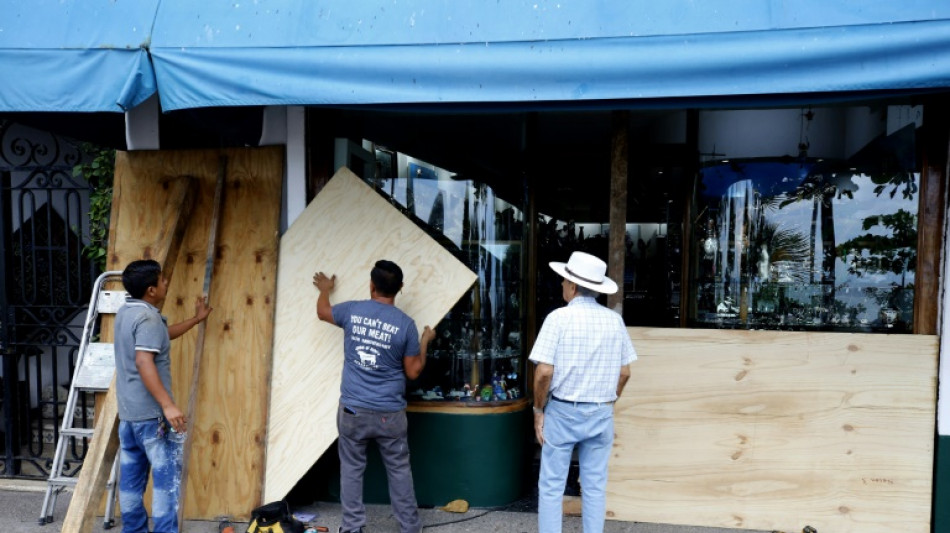
| RBGPF | 100% | 59.84 | $ | |
| NGG | 0.66% | 59.31 | $ | |
| GSK | -0.12% | 34.08 | $ | |
| BCC | -1.91% | 120.63 | $ | |
| CMSD | -0.67% | 23.32 | $ | |
| RIO | -0.41% | 59.01 | $ | |
| BP | 0.38% | 28.96 | $ | |
| CMSC | -0.85% | 23.46 | $ | |
| SCS | 0.58% | 11.97 | $ | |
| BTI | -0.33% | 36.31 | $ | |
| AZN | -0.39% | 66.26 | $ | |
| RELX | -0.61% | 45.58 | $ | |
| RYCEF | 0.14% | 7.27 | $ | |
| JRI | -0.41% | 12.15 | $ | |
| BCE | -0.93% | 22.66 | $ | |
| VOD | 0.12% | 8.43 | $ |
'Extremely dangerous' Hurricane Lidia heads for Mexico

Hurricane Lidia became an "extremely dangerous" Category 4 storm on Tuesday as it headed toward beach resorts on Mexico's Pacific coast, threatening to bring flooding and mudslides, forecasters said.
In the seaside city of Puerto Vallarta -- a popular destination for Mexican and foreign visitors -- shopkeepers boarded up windows and piled up sandbags in case of flooding.
School classes were suspended in some areas and residents were urged to take precautions, such as moving to temporary shelters and staying away from the sea.
President Andres Manuel Lopez Obrador said civil protection personnel were on alert and around 6,000 members of the armed forces had been deployed to help residents.
Lidia was packing maximum sustained winds of around 140 miles (220 kilometers) per hour and additional strengthening was possible before it makes landfall later Tuesday, the US National Hurricane Center (NHC) said.
It intensified to a Category 4 hurricane -- the second highest on the five-step Saffir-Simpson scale, according to the NHC.
Dangerous winds and heavy rains were expected to begin on Tuesday afternoon, it warned.
Lidia was located about 110 miles southwest of Puerto Vallarta, in Jalisco state, the report said.
It was expected to bring rainfall of up to 12 inches (30 centimeters) to Nayarit, Sinaloa and Jalisco states, according to the NHC.
"These rains will likely produce flash and urban flooding, along with possible mudslides in areas of higher terrain near the coast," it warned.
"A dangerous storm surge is expected to produce significant coastal flooding near and to the south of where the center makes landfall. Near the coast, the surge will be accompanied by large and dangerous waves," it added.
Hurricanes hit Mexico every year on both its Pacific and Atlantic coasts, usually between May and November.
Just this week, Tropical Storm Max left two people dead and dozens of houses flooded in the southern state of Guerrero, one of the country's poorest regions, authorities said Tuesday.
Max made landfall on Monday, causing a river to overflow before dissipating.
One person drowned trying to protect livestock and another died in a road accident during the storm, civil protection official Roberto Arroyo told AFP by telephone.
In August, storm Hilary, which at one point was a Category 4 hurricane, caused one death and damaged infrastructure as it hit the northwestern state of Baja California.
Scientists have warned that storms are becoming more powerful as the world gets warmer with climate change.
A. Walsh--BTZ

 London
London

 Manchester
Manchester
 Glasgow
Glasgow
 Dublin
Dublin
 Belfast
Belfast
 Washington
Washington
 Denver
Denver
 Atlanta
Atlanta
 Dallas
Dallas
 Houston Texas
Houston Texas
 New Orleans
New Orleans
 El Paso
El Paso
 Phoenix
Phoenix
 Los Angeles
Los Angeles



